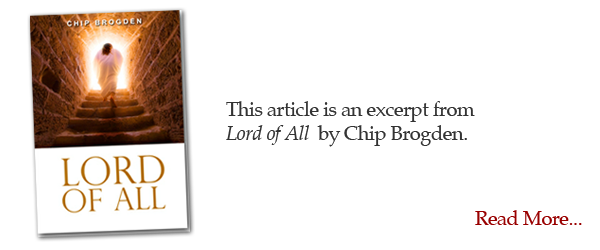“Not I, but Christ” (Galatians 2:20). This is the goal of the disciple of Jesus. But how is that goal obtained? Where does one learn this single-hearted, single-minded devotion? This is what the Holy Spirit intends to teach us through the principles of Increase and Decrease. With less of me, there is more of Him.
Decreasing Self is the same as putting away sin. When we put off the old man, and when we decide to walk in holiness before the Lord, does it mean that somehow we are transformed into spiritually enlightened beings who are no longer capable of sinning? Of course not. To reckon ourselves “dead to sin” does not mean that we are not able to sin. If only it were that easy! On the contrary, we know very well that no matter how much we reckon ourselves to be dead to sin, there is still the possibility of sinning. Being dead to sin does not mean being unable to sin; it simply means we are not bound to sin – sin as a driving force in our life has been broken. Now, if we choose, we can live a different life. We have the power, through this new life, to resist satan and overcome the old life of sin. But nothing prevents us from falling back into our old ways. We can just as easily sin now, if we so choose, even though we need not do so.
Similarly, being “dead to Self” does not mean that I am suddenly transformed into a person who is incapable of thinking, feeling, or acting. Nor does it imply that I am incapable of self-centeredness. Quite the contrary. Self never dies, which is why Self must be denied daily. If Self were to die then it would not have to be constantly denied. The fact that we are urged to take up the Cross daily, and daily die to Self, is proof enough that Self never dies.
In a religious family it sometimes happens that someone falls in love and desires to marry a person of a different religious background. In some cases this is viewed as a serious sin with grave consequences. The family will do everything possible to persuade the couple not to get married. Finally, the patriarch of the family may say, “If you marry this person against my wishes, you will be dead to me!” And if they proceed anyway, the family cuts off all relationship and communication with that family member. In some extreme cases they may even hold a funeral and weep and mourn over the “dead” loved one who abandoned the faith and forsook their family.
Of course, this person is not really dead at all. But they are considered “dead” to the family. In similar manner, when we consider ourselves “dead to sin” or “dead to Self” or “dead to the ways of this world” it should be understood that sin, Self, and the world continue to exist. Our declaration does not destroy anything; it only affirms that we have chosen to cut off all communication and all relationship with sin, Self and the ways of this world. What if we fail to reckon ourselves dead to sin, or fail to deny Self, or begin to long for the things of this world? Then sin and Self and the world are right there, and will seek to re-establish their former place the moment we no longer consider ourselves dead.
Is this all just a mental game? No. But it is a mindset, a philosophy, an attitude, a perspective, a viewpoint about our spiritual life that eventually becomes an attitude of the spirit, heart, mind, and soul. Taking up the cross daily means daily choosing to deny Self and live for God. Before, I might have been preoccupied with my needs, my wants, my desires, my wishes, and my will. I might have even become religious in order to persuade God to give me the things I wanted. I might have used prayer, or church attendance, or Bible reading to try and prove that I was worthy of God’s blessings, or to secure my future home in heaven.
But now, I choose to set aside all those self-centered things and embrace a higher life of Love. And this Love is not the kind of love where I am absorbed and obsessed with what I want all the time. Instead, this Love causes me to look away from myself altogether and ask questions that never occur to the Self-centered. What is God’s Will? What does God want? What does God desire? What does God need? And then, once that is discovered, to follow through with simple obedience to the revealed Will of God, motivated not by fear of punishment or hope of reward, but by the simple love of God. It is to meet His Need by putting His Kingdom first, even if it is sometimes contrary to what I would naturally choose for myself.
There is only one reason in the world why a person would deny their own impulses and risk everything for someone else: love. Anything less than love is mere religion and self-seeking. To deny Self is to love God more than Self. And if we love Him, we will obey Him.
This is the heart-attitude that is basically summed up in the Cross. The Cross represents “not my will, but God’s Will” and signifies the ultimate in being decreased: death. But as we know, the Cross did not, and does not, end in death, though it certainly kills. We pass through the death and decreasing of the Cross in order to experience the new life and increasing of Christ on resurrection ground.













